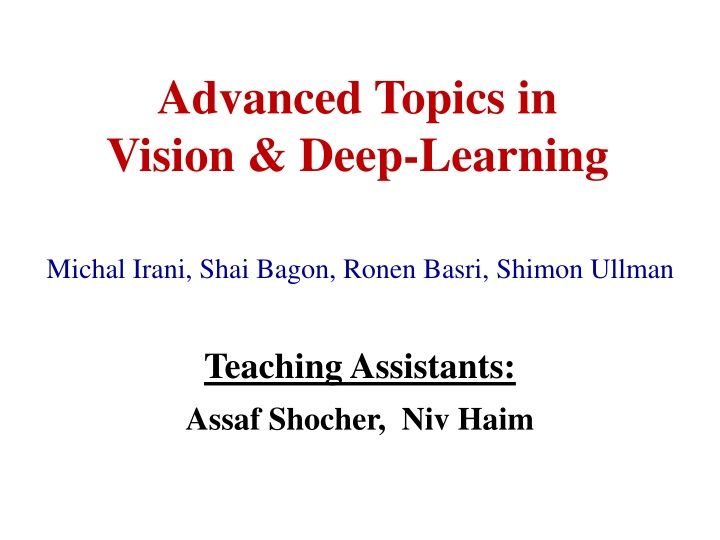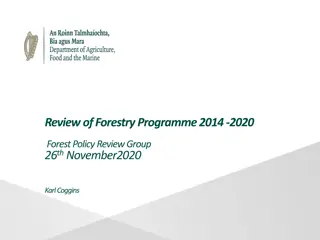
Mastering Advanced Topics in Vision & Deep Learning
Delve into advanced topics and recent papers in computer vision and deep learning with a focus on delivering clear and engaging presentations. Learn the key elements of a good talk, including effective slide design, content organization, and speaker responsibilities. Propel your understanding and participation in the course to excel in this cutting-edge field.
Download Presentation

Please find below an Image/Link to download the presentation.
The content on the website is provided AS IS for your information and personal use only. It may not be sold, licensed, or shared on other websites without obtaining consent from the author. If you encounter any issues during the download, it is possible that the publisher has removed the file from their server.
You are allowed to download the files provided on this website for personal or commercial use, subject to the condition that they are used lawfully. All files are the property of their respective owners.
The content on the website is provided AS IS for your information and personal use only. It may not be sold, licensed, or shared on other websites without obtaining consent from the author.
E N D
Presentation Transcript
Advanced Topics in Vision & Deep-Learning Michal Irani, Shai Bagon, Ronen Basri, Shimon Ullman Teaching Assistants: Assaf Shocher, Niv Haim
Course Goals: Cover advanced topics & important recent papers in CV & DL. Learn how to give a good talk. Course Requirements: Attend all lessons (in case of miluim, illness, or other justified absence you must notify us). Read the weekly assigned material (usually one paper per week). Give a presentation on one topic (in pairs, in English). Select the reading assignment for your topic (notify a week ahead). Grades will be based on: 1. Quality & clarity of presentation (the ability to present the material in a clear and simple way) 2. Level of understanding of the material. 3. Active participation in class in other lessons. 4. Fulfillment of reading assignments. 5. Attendance.
What makes a good talk? DOs & DONTs Turn a bunch of papers into a single coherent topic/story/thread (not just a laundry list of papers ) Focus on the main message; skip unimportant/minor details. Refrain from too many equations difficult to follow in a talk! (keep only the critical ones; try to illustrate/explain things visually) If an equation is important and must be in the talk: go over it slowly explain it intuitively through a simple example or a special case. You are not stupid! Whatever was difficult for you to understand, will also be difficult for the class to understand! So think how to explain it in a simple intuitive way; help the class understand it.
What makes a good talk? DOs & DONTs Don t clutter slides with too much text! Visual slides are better than textual slides! Fonts must be large (all fonts in the presentation -- at least 24 pts) Equations must be VERY LARGE. Usually one message per slide (conveyed by the title of the slide). Time your talk: Lessons are 1.5 hour including questions & discussion. Plan for a (combined) 60-70 min talk. Do a dry-run together with your partner to time yourselves! Have someone else listen to your talk to make sure it is clear.
What makes a good talk? DOs & DONTs These are not 2 separate talks, but a single unified & coherent talk. Both speakers are responsible for the quality of the entire talk. Both speakers should read all the papers and be able to discuss them. You may find that you need to read more papers than those listed (to better understand/explain the material; background material, etc.) You may need to give a short Introduction to the topic to make the talk self-contained (e.g., background material, important tools or prior-knowledge they rely on, etc.) Please restrict the Introduction to no more than 10-15 min (to leave enough time for the advanced papers). BUT Please review with the TAs ahead of time your planned material for the talk. Any change in the selection of papers (which is sometimes appropriate) must be approved by us and/or by the TAs.


